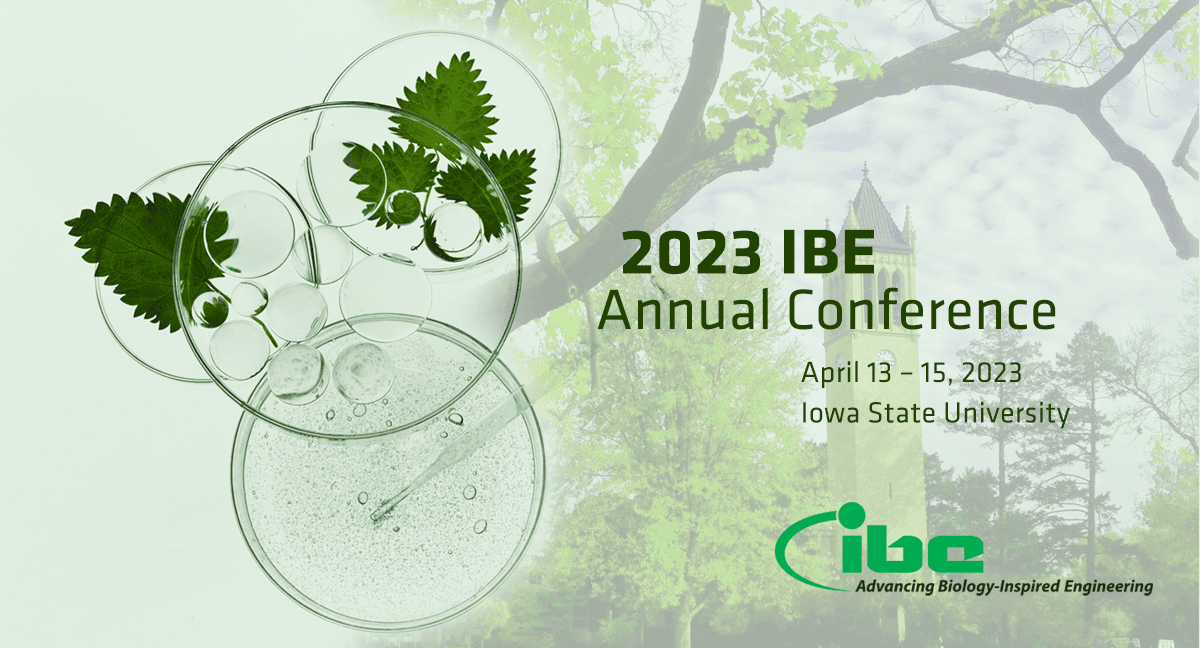2023 Annual Conference
April 13 – 15, 2023
Iowa State University
Gateway Hotel & Conference Center

Announcing the IBE DNA (Dynamic Narrative Adventure) Challenge!
Does your student chapter have a creative side? Do you have an interesting story to tell? You are hereby challenged to enter the IBE DNA (Dynamic Narrative Adventure) Challenge!
Contest Rules:
- Can be any form of visual media (song, monologue, skit, presentation, poetry, dance, etc.)
- Must relate to Biological Engineering in some way
- Must be 3-5 minutes in length
- Must be appropriate (no foul language, gestures, etc.)
- Be fun, but also informative in some sense
- Must be submitted in MP4 format
Deadline for Submissions: 01 April 2023
Submit your MP4 video to Dr. Kurt Rosentrater at Iowa State University, karosent@iastate.edu
Prizes will be awarded!
Need some ideas to stir your creativity? Check these out for inspiration:
(16) Zheng Lab - Bad Project (Lady Gaga parody) - YouTube
Watch the winner of this year's ‘Dance Your Ph.D.' contest | Science | AAAS
Keynote Address: Friday Morning, April 14th
Opportunities and Challenges in Advancing Bio-based Chemical Products
Presented by Dr. Brent Shanks, Mike and Jean Steffenson Faculty Chair, Anson Marston Distinguished Professor in Engineering, Department of Chemical and Biological Engineering, Iowa State University
Due to rapid advances in biotechnology coupled with a push for sustainable chemical products in a circular bioeconomy, bio-based products are receiving an increasing level of attention. While new economic and societal drivers are emerging, bio-based chemical product development is not new, so it is useful to consider historical lessons when shaping a bio-based product strategy. Learnings from bio-based products that have been commercialized will be discussed in the context of their implications on the opportunities and challenges for the area. Highlighted will be the need for more systematic strategies that are robust in the face of realistic technological and economic constraints, as these postulated strategies will dictate the research questions that need to be addressed. One such strategy that we are pursuing is the synthesis of “bioprivileged molecules,” which are biology-derived chemical species that can be readily converted to a diversity of chemical products, including drop-in replacements and novel species. The dual potential for bioprivileged molecules can help create value from biomass, since innovative bioproducts represent a powerful driver for the development of bio-based chemical products.
Keynote Address: Friday Afternoon, April 14th
Silo-breaking Approaches to Running a Large, Transdisciplinary Project: A Case Study in Perennial Ground cover Systems
Presented by Dr. Raj Raman, Iowa State University, Department of Agricultural and Biosystems Engineering
Addressing the wicked problems or grand-challenges of the 21st-century depends on a combination of groundbreaking discoveries (or inventions) and/or the integration of multiple new and existing approaches. Scientific reward systems -- which have been in place for well over a century and have therefore key cultural/environmental drivers in the selection process for working scientists and research engineers -- have focused on the former over the latter. In large transdisciplinary research projects (and in large engineering design projects), there is a critical need to encourage integration of technical expertise. This talk will describe approaches the RegenPGC project (regenpgc.org) is using to break down disciplinary silos in the project's quest to perennialize working lands, thereby improving soil conservation and water quality while maintaining or increasing profitability, enhancing biomass production, and improving overall system resilience.
Keynote Address: Saturday, April 15th
Regenerative Engineering: Enabling the Practice of Regenerative Medicine
Presented by Guillermo A. Ameer, Sc. D.
Regenerative engineering is the convergence of advances in materials science, physical sciences, stem cell and developmental biology, and translational medicine to develop tools that enable the regeneration and reconstruction of tissue and organ function. Dr. Ameer will describe how materials can be engineered to play a critical role in treating tissue and organ defects and dysfunction by promoting cellular processes that are conducive to regeneration. Applications of these materials to treat orthopedic injuries will be discussed.
About the IBE Meeting
Come for the Content. Stay for the Networking.
The IBE Annual Meeting is a gathering of the world’s leading researchers and educators in biological engineering, who share a passion for building a better future.
The 2023 Annual Meeting will include technical sessions in key areas such as bioenvironmental engineering, biological sensing, bioprocessing, public health, and much more. We hope that you’ll join us and share your research highlights in biology-inspired engineering!
The intimate setting and diverse makeup of the conference are catalysts for multidisciplinary interactions with attendees who actively participate in shaping the biological engineering profession.
Undergraduate and graduate students are encouraged to attend. The Meeting is an excellent opportunity to develop professional skills and network with peers and professionals in the industry through activities such as poster sessions, bioethics essay competition and social activities.
